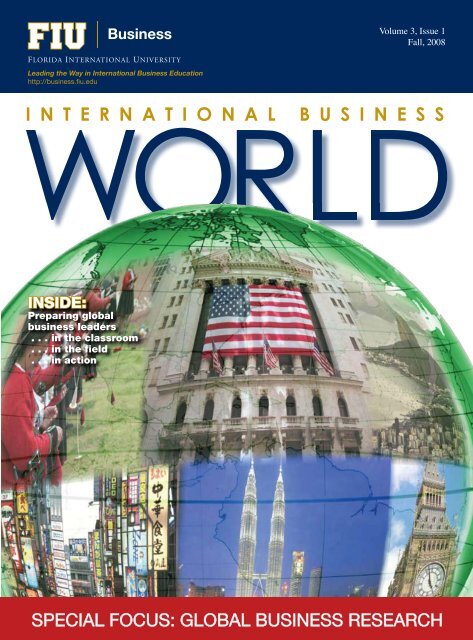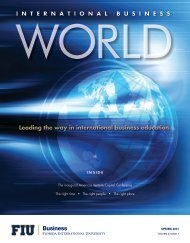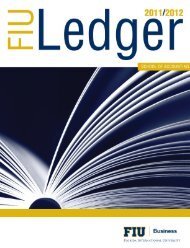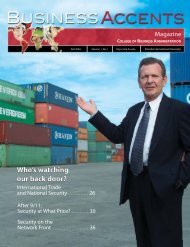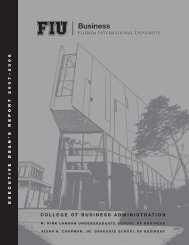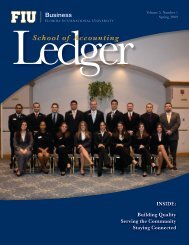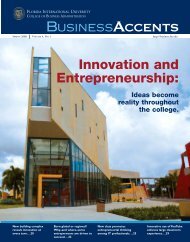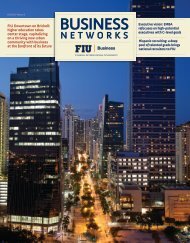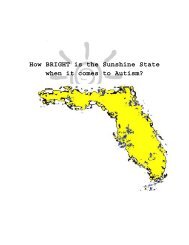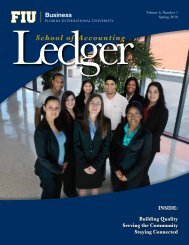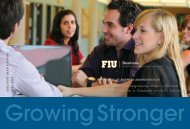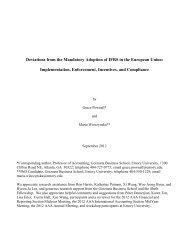2008 - FIU College of Business - Florida International University
2008 - FIU College of Business - Florida International University
2008 - FIU College of Business - Florida International University
Create successful ePaper yourself
Turn your PDF publications into a flip-book with our unique Google optimized e-Paper software.
Volume 3, Issue 1<br />
Fall, <strong>2008</strong><br />
Leading the Way in <strong>International</strong> <strong>Business</strong> Education<br />
http://business.fiu.edu<br />
InternatI onal BusI ness<br />
WORLD<br />
INSIDE:<br />
Preparing global<br />
business leaders<br />
. . . in the classroom<br />
. . . in the field<br />
. . . in action<br />
SPECIAL FOCUS: GLOBAL BUSINESS RESEARCH
The <strong>College</strong> <strong>of</strong> <strong>Business</strong> Administration<br />
Leading the Way in <strong>International</strong> <strong>Business</strong> Education<br />
<strong>Florida</strong> <strong>International</strong> <strong>University</strong>’s (<strong>FIU</strong>) <strong>College</strong><br />
<strong>of</strong> <strong>Business</strong> Administration, South <strong>Florida</strong>’s leading<br />
business school with unique expertise in international<br />
business, entrepreneurship, and a range <strong>of</strong> financial<br />
services—from accounting to banking to real estate—is<br />
the largest <strong>of</strong> the university’s pr<strong>of</strong>essional schools. It<br />
also is known for its innovative, market-driven, and<br />
technology-enabled educational programs for both<br />
degree- and non-degree-seeking business pr<strong>of</strong>essionals<br />
in South <strong>Florida</strong> and beyond. Among the college’s<br />
more than 30,000 alumni are some <strong>of</strong> the region’s most<br />
successful business leaders and entrepreneurs.<br />
Every year, approximately 6,000 students are<br />
enrolled in undergraduate business courses in the<br />
Landon Undergraduate School <strong>of</strong> <strong>Business</strong> and more<br />
than 1,200 graduate students study in the Chapman<br />
Graduate School <strong>of</strong> <strong>Business</strong>. Another 1,000 participate<br />
annually in one or more executive and pr<strong>of</strong>essional<br />
education programs.<br />
The college enjoys a national and global reputation<br />
in international business education at both the<br />
undergraduate and graduate levels. Since 2004, U.S.<br />
News & World Report has ranked the undergraduate<br />
international business programs among the fifteen<br />
best in the nation, and the graduate international<br />
business programs in the top 25 (2006-<strong>2008</strong>). Since<br />
2002, the graduate school has been in the top 15<br />
percent <strong>of</strong> <strong>Business</strong>Week’s biannual ranking <strong>of</strong> business<br />
schools, which includes only those in the United States<br />
accredited by AACSB. The school is the only one in<br />
South <strong>Florida</strong> included in the rankings. The Princeton<br />
Review’s “Best 290 <strong>Business</strong> Schools,” <strong>2008</strong> edition,<br />
and its “Best 296 <strong>Business</strong> Schools,” 2009 edition, list<br />
the college as one <strong>of</strong> the best business schools in the<br />
country.<br />
Also, since 1998, Hispanic <strong>Business</strong> has ranked the<br />
college in its Top 10, and Hispanic Trends in its Top<br />
25 from 2003-2005. In <strong>2008</strong>, América-Economía, a<br />
leading pan-regional business journal, ranked it<br />
among the top 25 business schools in the world for<br />
Latin American students; it has been in their rankings<br />
since 2004. It also is among the top international<br />
business schools included in Latin Trade’s annual MBA<br />
ratings (2006, 2007), which examines features like<br />
curricular innovation, entrepreneurial focus, diversity<br />
<strong>of</strong> the student body, and more. In addition, <strong>FIU</strong> has<br />
appeared in Expansion Magazine’s “Best Global MBAs”<br />
listing since 2006.<br />
In both 2006 and 2007, Fortune Small <strong>Business</strong><br />
identified the college as one <strong>of</strong> “Ten Cool <strong>College</strong>s for<br />
Entrepreneurs” in the United States.<br />
Financial Times (2006, 2007) listed <strong>FIU</strong>’s Executive<br />
MBA program in its ranking <strong>of</strong> the Top 85 Executive MBA<br />
programs in the world, making it the highest-ranked<br />
program in <strong>Florida</strong>.<br />
The college is one <strong>of</strong> only 7 percent <strong>of</strong> all business<br />
schools globally and among fewer than one third in<br />
the United States that is accredited by AACSB<br />
<strong>International</strong>—The Association to Advance Collegiate<br />
Schools <strong>of</strong> <strong>Business</strong>. That means it has earned the<br />
highest standard <strong>of</strong> achievement among business<br />
schools worldwide. It tells prospective students, faculty,<br />
recruiters, and employers that the school produces<br />
graduates who are prepared to succeed in the global<br />
marketplace. AACSB <strong>International</strong> accreditation<br />
demands a superior faculty, high-caliber teaching, and<br />
meaningful interaction among students and faculty.<br />
Accredited by AACSB <strong>International</strong>—The Association to Advance Collegiate Schools <strong>of</strong> <strong>Business</strong><br />
<strong>International</strong> <strong>Business</strong> World is published by the <strong>College</strong> <strong>of</strong> <strong>Business</strong> Administration at <strong>Florida</strong> <strong>International</strong> <strong>University</strong>, Miami, <strong>Florida</strong>.<br />
EDITOR: Sally M. Gallion. Questions? Comments? E-mail Sally.Gallion@fiu.edu.
Preparing Global Leaders…in the Classroom<br />
Undergraduate international business program<br />
captures high ranking in important list . . . again.<br />
For the<br />
fifth straight<br />
year, the<br />
<strong>College</strong> <strong>of</strong><br />
<strong>Business</strong><br />
Administration<br />
secured<br />
a spot in the<br />
top fifteen in<br />
U.S. News &<br />
World Report’s<br />
(USNWR) “America’s Best <strong>College</strong>s<br />
2009” in the undergraduate international<br />
business (IB) specialty. Ranking<br />
eleventh, it was the only IB program<br />
in <strong>Florida</strong> to appear in the top<br />
fifteen in that category. Students and<br />
families regard the annual USNWR<br />
ranking—based on an evaluation by<br />
deans and their associates from the<br />
Association to Advance Collegiate<br />
Schools <strong>of</strong> <strong>Business</strong> (AACSB)—as a<br />
key reference tool for evaluating topquality<br />
collegiate programs.<br />
“We have one <strong>of</strong> the largest<br />
undergraduate international<br />
business programs (based<br />
on enrollment) in the<br />
country.”<br />
—Robert Hogner, associate<br />
pr<strong>of</strong>essor, Department <strong>of</strong><br />
Management and <strong>International</strong><br />
<strong>Business</strong>, and development<br />
director for undergraduate<br />
international business programs<br />
“The rankings show the success<br />
<strong>of</strong> the efforts <strong>of</strong> our students, faculty,<br />
and staff,” said Joyce J. Elam,<br />
executive dean <strong>of</strong> the business school,<br />
whose support Hogner credits for<br />
the ongoing nationwide recognition<br />
<strong>of</strong> the program. “They also give<br />
us the motivation to continue<br />
strengthening the programs, services,<br />
and opportunities we <strong>of</strong>fer in the<br />
international business area. We are<br />
very excited to have maintained our<br />
recognition <strong>of</strong> excellence this year.”<br />
Beyond enrollment and CIBER,<br />
additional factors contribute to<br />
the program’s heightened stature.<br />
• Development <strong>of</strong> an <strong>International</strong><br />
<strong>Business</strong> Honors (IB Honors)<br />
program created in partnership with<br />
the university’s Honors <strong>College</strong>,<br />
and the first undergraduate program<br />
at the university to require community<br />
service and a senior thesis<br />
for graduation; William Schneper,<br />
assistant pr<strong>of</strong>essor, Department<br />
<strong>of</strong> Management and <strong>International</strong><br />
<strong>Business</strong>, serves as IB Honors faculty<br />
director;<br />
• Participation in the Consortium<br />
for Undergraduate <strong>International</strong><br />
<strong>Business</strong> Education (CUIBE), a<br />
clearinghouse and idea-sharing<br />
resource for its 24 members from<br />
well-known international business<br />
programs;<br />
• Establishment <strong>of</strong> the <strong>International</strong><br />
<strong>Business</strong> Honor Society (IBHS),<br />
one <strong>of</strong> the first nationally and now a<br />
model for other universities;<br />
• Creation <strong>of</strong> the Global Leadership<br />
and Service Project (GLSP)<br />
concept, taking students from the<br />
university to Thailand for ten-day<br />
service projects, usually at three<br />
sites; over its four-year history, the<br />
GLSP model has spread to other<br />
universities through the inclusion <strong>of</strong><br />
their students via travel grants; and<br />
• Launch <strong>of</strong> Journal for Global <strong>Business</strong><br />
and Community (JGBC), a<br />
multidisciplinary online journal<br />
<strong>of</strong>fering undergraduates publication<br />
opportunities and the <strong>of</strong>ficial<br />
journal <strong>of</strong> CUIBE. n<br />
“We have one <strong>of</strong> the largest<br />
undergraduate international business<br />
programs (based on enrollment) in<br />
the country,” said Robert Hogner,<br />
associate pr<strong>of</strong>essor, Department <strong>of</strong><br />
Management and <strong>International</strong> <strong>Business</strong>,<br />
and development director for<br />
undergraduate international business<br />
programs. “Also, the presence <strong>of</strong> a<br />
Center for <strong>International</strong> <strong>Business</strong><br />
Education and Research (CIBER) at<br />
<strong>Florida</strong> <strong>International</strong> <strong>University</strong> adds<br />
prestige to our program.”<br />
Robert Hogner, associate pr<strong>of</strong>essor, Department <strong>of</strong> Management and <strong>International</strong><br />
<strong>Business</strong>, and development director for undergraduate international business programs,<br />
and William Schneper, assistant pr<strong>of</strong>essor, Department <strong>of</strong> Management and <strong>International</strong><br />
<strong>Business</strong>, and <strong>International</strong> <strong>Business</strong> Honors faculty director<br />
1
Preparing Global Leaders…in the Classroom<br />
Global Dual Degree program<br />
exponentially increases<br />
opportunities for graduates.<br />
2<br />
A worldwide network embracing<br />
33 business schools enables students<br />
to earn an MBA from their home institution<br />
and a Master <strong>of</strong> <strong>International</strong><br />
<strong>Business</strong> (MIB) from the Chapman<br />
Graduate School in the <strong>College</strong><br />
<strong>of</strong> <strong>Business</strong> Administration in less<br />
time than it would take to complete<br />
them sequentially. That’s not all: the<br />
students experience a second culture,<br />
academic setting, and business environment,<br />
and they establish their own<br />
global network <strong>of</strong> relationships.<br />
Sixty-five students from fifteen<br />
partner universities have graduated.<br />
French student who studied in<br />
Canada, Japan, and Morocco<br />
expands her world view.<br />
Claire<br />
Neuschwander<br />
(MIB ’08)<br />
For Claire<br />
Neuschwander<br />
(MIB<br />
’08), having<br />
two master’s<br />
degrees, “one<br />
from one great<br />
American<br />
school and one<br />
from a great<br />
French school,<br />
EDHEC, means<br />
that, everywhere in the world, I can<br />
present a degree that will appeal, and<br />
therefore, I can go anywhere I want in<br />
my career.”<br />
Neuschwander, who holds a<br />
bachelor’s <strong>of</strong> business administration<br />
and a master’s <strong>of</strong> management<br />
from EDHEC, landed a job upon<br />
her graduation as manager for Latin<br />
America and Caribbean, at Sothys,<br />
Bernard Cassiere, Simone Malher, a<br />
French cosmetics corporation. From<br />
its Miami location, she works with<br />
distributors and spas in both geographies,<br />
handling sales, promotions,<br />
negotiations, and accounting.<br />
“Because <strong>of</strong> my business school<br />
background, I knew these subjects,<br />
but interacting with the MIB<br />
students from other countries gave a<br />
new light to all I knew and I discovered<br />
issues I knew nothing about,”<br />
said Neuschwander, who foresees a<br />
possible move to Latin America, or<br />
even back to France to start her own<br />
company.<br />
Industrial engineer from Chile<br />
gains business expertise, prizes<br />
personal aspects <strong>of</strong> program.<br />
Patricio Danus<br />
(MIB ’08)<br />
Patricio Danus<br />
(MIB ’08), an<br />
industrial engineer<br />
with an undergraduate<br />
degree from<br />
the <strong>University</strong> <strong>of</strong><br />
Chile in Santiago,<br />
expects to complete<br />
a master’s degree<br />
from there in global<br />
management in December, <strong>2008</strong>. As<br />
part <strong>of</strong> that master’s program, he had<br />
to select an international program<br />
from a choice <strong>of</strong> seven that had an<br />
agreement with his university. He<br />
chose the college’s MIB.<br />
“I liked the MIB courses, which<br />
focus on important issues in today’s<br />
global business environment, and I<br />
thought Miami would be a fine place<br />
to live,” he said.<br />
Coming to the United States for<br />
the first time, he appreciated “the<br />
great assistance from the program<br />
staff,” and admired “the ability <strong>of</strong> the<br />
pr<strong>of</strong>essors to generate a challenging<br />
learning environment.”<br />
Like Neuschwander, Danus, who<br />
looks forward to “assuming roles <strong>of</strong><br />
responsibility in a company or my<br />
own business,” particularly valued<br />
the international composition <strong>of</strong> the<br />
group.<br />
“It was a good thing to have classmates<br />
from Latin America, North<br />
America, Europe, and Asia,” he said.<br />
“I could share with them, and get to<br />
know their cultures.” n<br />
Dual Degree partners<br />
Argentina<br />
IAE (Buenos Aires)<br />
UADE (Buenos Aires)<br />
Universidad Católica<br />
(Córdoba)<br />
Brazil<br />
COPPEAD (Rio de Janeiro)<br />
FEA-RP/USP (Ribeirão Preto)<br />
Colombia<br />
Universidad de los Andes<br />
(Bogotá)<br />
Universidad del Norte<br />
(Barranquilla)<br />
Costa Rica<br />
INCAE (San José)<br />
Chile<br />
Universidad Adolfo Ibáñez<br />
(Santiago)<br />
Universidad de Chile<br />
China<br />
Qingdao <strong>University</strong> (Qingdao)<br />
Shandong Economic<br />
<strong>University</strong> (Shandong)<br />
France<br />
EDHEC (Nice and Lille)<br />
Reims Management School<br />
(Reims)<br />
Montpellier Sup de Co<br />
(Montpellier)<br />
Germany<br />
Leipzig Graduate School <strong>of</strong><br />
Management (Leipzig)<br />
Munich <strong>Business</strong> School<br />
(Munich)<br />
Greece<br />
ALBA (Athens)<br />
Hungary<br />
CEU <strong>Business</strong> School<br />
(Budapest)<br />
India<br />
Guru Gobind Indraprastha<br />
<strong>University</strong><br />
Uttar Pradesh Technical<br />
<strong>University</strong><br />
Italy<br />
ALMA Graduate School at<br />
Universita Di Bologna<br />
(Bologna)<br />
MIP Politecnico di Milano<br />
Mexico<br />
EGADE Tecnológico de<br />
Monterrey (Monterrey)<br />
ITAM (Mexico City)<br />
Universidad Anáhuac<br />
(Mexico City)<br />
Peru<br />
Universidad ESAN (Lima)<br />
Portugal<br />
ISCTE (Lisbon)<br />
Puerto Rico<br />
Universidad de Puerto Rico<br />
(San Juan)<br />
Spain<br />
ESIC (Madrid)<br />
Trinidad and Tobago<br />
The <strong>University</strong> <strong>of</strong> West Indies<br />
(Arthur Lok Jack Graduate<br />
School <strong>of</strong> <strong>Business</strong>)<br />
Uruguay<br />
ORT (Montevideo)<br />
Venezuela<br />
IESA (Caracas)
Preparing Global Leaders…in the Classroom<br />
China Track in <strong>International</strong> MBA translates<br />
into full-time job in China for one graduate.<br />
According to a Chinese proverb,<br />
“A journey <strong>of</strong> a thousand miles must<br />
begin with a single step.”<br />
For James Dotson (IMBA ’08),<br />
a journey to China began with<br />
<strong>Business</strong>Week.<br />
“After I came across <strong>Florida</strong> <strong>International</strong><br />
<strong>University</strong> in the publication,<br />
I visited the university’s web<br />
site, where I learned about the China<br />
Track in the <strong>International</strong> MBA<br />
(IMBA) program,” said Dotson, who<br />
was very interested in the growing<br />
relationship between China and the<br />
United States, and who “began to see<br />
the potential for countless business<br />
opportunities for Americans fluent in<br />
Mandarin.”<br />
The China Track in the IMBA<br />
<strong>of</strong>fered an ideal starting point. It<br />
includes nine months <strong>of</strong> studying<br />
the Chinese language and culture,<br />
followed by two months at Qingdao<br />
<strong>University</strong> for what Dotson describes<br />
as “a sort <strong>of</strong> ‘on-the-job training’—<br />
that is, an immersion style that gives<br />
you no crutches and forces you to<br />
focus on the language study.”<br />
His experiences in the IMBA<br />
program paid <strong>of</strong>f immediately: he<br />
has secured a position with a Hisense<br />
subsidiary called Hisense <strong>International</strong>,<br />
a company in the midst <strong>of</strong><br />
globalization. He assists in marketing,<br />
public relations, and advertising<br />
for Saudi Arabia, Egypt, Australia,<br />
Canada, and the United States. The<br />
company has provided him with a<br />
twentieth-floor condo that gives him<br />
a view <strong>of</strong> the bay, and his wife will be<br />
teaching English in a nearby school.<br />
Dotson sees values <strong>of</strong> program as<br />
he looks back and ahead.<br />
He appreciates the ways in which<br />
the program prepared him for his<br />
current situation and for helping<br />
position him to fulfill his long-term<br />
aspirations: to be a marketing consultant<br />
for Chinese companies looking<br />
to expand into the United States and<br />
vice versa.<br />
“The program’s quality is undeniable,<br />
and given that international<br />
expansion is becoming a must for<br />
corporations, it has an edge because<br />
the student body is so internationally<br />
James Dotson in the May Fourth Square, located in<br />
Qingdao’s central business district<br />
diverse,” he said. “It’s group-oriented,<br />
and each group <strong>of</strong> five students<br />
consisted <strong>of</strong> people from at least<br />
three different countries. As a result,<br />
I now have good friends and valuable<br />
business connections from around<br />
the globe that will last throughout<br />
my career.”<br />
But for Dotson, for now, the focus<br />
remains on language acquisition.<br />
“Pick up any business publication<br />
and read the success story <strong>of</strong> a<br />
business person fluent in Mandarin<br />
and you’ll read that that success came<br />
with a high price—probably higher<br />
than learning any other language”<br />
he said. “I’ve continued to study the<br />
language every day since I arrived in<br />
June, and I’ll stay in China until I’m<br />
pr<strong>of</strong>icient.” n<br />
James Dotson and a friend the night <strong>of</strong> the Beijing Olympics opening<br />
ceremony<br />
3
Preparing Global Leaders…in the Classroom<br />
Trips to China reinforce the importance <strong>of</strong><br />
global business savvy.<br />
The Master <strong>of</strong> <strong>International</strong> <strong>Business</strong> (MIB) international business trip to China coincided with the<br />
dedication <strong>of</strong> the Olympic Sailing Center during which Tomislav Mandakovic, associate dean,<br />
Chapman School, represented The Americas for the ribbon-cutting.<br />
4<br />
Both the Master <strong>of</strong> <strong>International</strong><br />
<strong>Business</strong> (MIB) and the Executive<br />
MBA (EMBA) programs in the<br />
<strong>College</strong> <strong>of</strong> <strong>Business</strong> Administration<br />
interweave theory and its applications.<br />
Nothing provides more <strong>of</strong> the latter<br />
than international trips, structured<br />
to give students firsthand exposure<br />
to the challenges and possible paths<br />
to success in the global environment.<br />
The two most recent trips took a<br />
complement <strong>of</strong> students, faculty, staff,<br />
and alumni to China.<br />
Olympics preparations form<br />
backdrop to MIB trip.<br />
The MIB international business<br />
trip gave the 45-person group the<br />
chance to tour businesses and universities<br />
in Beijing and Qingdao, where<br />
the visit coincided with the dedication<br />
<strong>of</strong> the Olympic Sailing Center. The<br />
college’s contingent participated in<br />
the dedication ceremony representing<br />
The Americas—a once-in-a-lifetime<br />
opportunity, but only one <strong>of</strong> the many<br />
memorable experiences during their<br />
ten-day stay.<br />
“I was struck by the contrast between<br />
the ancient and modern—from<br />
ancient architecture and the bargaining<br />
techniques I learned in the local<br />
markets to high tech multinational<br />
facilities,” said MIB student Marisela<br />
Gonzalez, graduate assistant, Downtown<br />
MBA.<br />
“I was struck by the contrast<br />
between the ancient<br />
and modern.”<br />
—Marisela Gonzalez, MIB student<br />
and graduate assistant, Downtown<br />
MBA<br />
Gonzalez had “always dreamed <strong>of</strong><br />
going to China,” and having everything<br />
“perfectly organized by the<br />
program staff” made it even better.<br />
With tours <strong>of</strong> a Coca Cola plant<br />
and Hisense, where the group met<br />
with the chief financial <strong>of</strong>ficer, she<br />
sharpened her ideas about the potential<br />
in China, perhaps related to the<br />
art gallery she owns in Venezuela and<br />
which she hopes to expand.<br />
Olympic competitors aren’t the<br />
only ones who need agility.<br />
Thirty-five Executive MBA<br />
students, one alumnus, two pr<strong>of</strong>essors,<br />
and the program’s director spent<br />
ten days in Shanghai and Beijing,<br />
visiting seven companies and the U.S.<br />
Department <strong>of</strong> Commerce, Foreign<br />
Commercial Service, at the U.S. Embassy,<br />
as part <strong>of</strong> the Global <strong>Business</strong><br />
Trip, a cornerstone <strong>of</strong> the program.<br />
“The architecture, the construction,<br />
the traffic, the rise in consumer<br />
spending—all are signs <strong>of</strong> the fastpaced<br />
growth China is now experiencing,”<br />
said Martin J. Rodriguez<br />
(EMBA ’08, BS ’01), vice president<br />
<strong>of</strong> operations, STS Telecom, and a<br />
previous visitor to China.<br />
The lesson for him: any company<br />
or investor looking to do business in<br />
China must be flexible.<br />
“You have to be willing to<br />
take the time to build trust with<br />
your Chinese business partners.”<br />
—Martin J. Rodriguez (EMBA ’08, BS<br />
’01), vice president <strong>of</strong> operations, STS<br />
Telecom<br />
Martin J. Rodriguez (EMBA ’08, BS<br />
’01), vice president <strong>of</strong> operations, STS<br />
Telecom<br />
“You have to be willing to take the<br />
time to build trust with your Chinese<br />
business partners,” he said. “You also<br />
have to be agile—as at any given<br />
point, the rules governing your business<br />
relationship may change.”<br />
New destinations are being considered<br />
for upcoming trips.n
Preparing Global Leaders…in the Classroom<br />
Two popular graduate programs<br />
expand to Mexico and Panama.<br />
By dispatching faculty members<br />
across borders, the <strong>College</strong> <strong>of</strong> <strong>Business</strong><br />
Administration brings programs<br />
to students abroad eager to earn a<br />
<strong>Florida</strong> <strong>International</strong> <strong>University</strong><br />
degree. With an <strong>International</strong> Executive<br />
Master <strong>of</strong> <strong>Business</strong> Administration<br />
(IEMBA)–Jamaica, Master<br />
<strong>of</strong> Science in Human Resources<br />
Management (MSHRM)–Jamaica,<br />
and Pr<strong>of</strong>essional MBA (PMBA)–<br />
Dominican Republic already well<br />
established, the two newest global<br />
<strong>of</strong>ferings—the Master <strong>of</strong> Accounting<br />
(MACC) in Mexico and the PMBA<br />
in Panama immediately have generated<br />
enthusiastic responses.<br />
MACC helps prepare Mexican<br />
accountants for international role.<br />
Twenty-two students, many <strong>of</strong><br />
them highly experienced accountants,<br />
enrolled for the first MACC<br />
in Mexico, presented in partnership<br />
with ITAM, a Dual Degree partner<br />
and described by AméricaEconomía as<br />
Latin America’s number one business<br />
school. They will complete the<br />
twenty-month program with a master’s<br />
degree in accounting from both<br />
ITAM and <strong>Florida</strong> <strong>International</strong><br />
<strong>University</strong> and the background to sit<br />
for the demanding U.S. CPA Exam.<br />
“Our MACC program arrives at<br />
an opportune time for ITAM and<br />
Mexican accountants because it will<br />
enhance the participants’ pr<strong>of</strong>essional<br />
mobility at the precise moment that<br />
Mexico and the United States increase<br />
their international trade under<br />
NAFTA,” said Leonardo Rodríguez,<br />
emeritus pr<strong>of</strong>essor, School <strong>of</strong> Accounting<br />
and faculty director <strong>of</strong> the<br />
MACC program in Mexico.<br />
Among many benefits, Yanira<br />
Petrides, Rodríguez’s counterpart at<br />
ITAM, a full-time pr<strong>of</strong>essor, and a<br />
student in the program, feels “its international<br />
aspects, focusing on best<br />
practices in each country, will help<br />
me better understand the bi-cultural<br />
issues related to accounting as well as<br />
teaching methods.”<br />
“The program’s international<br />
aspects, focusing<br />
on best practices in each<br />
country, will help me better<br />
understand the bi-cultural issues<br />
related to accounting.”<br />
—Yanira Petrides, MACC faculty<br />
director, ITAM, full-time pr<strong>of</strong>essor,<br />
and student<br />
PMBA refines business skills<br />
<strong>of</strong> working pr<strong>of</strong>essionals . . .<br />
conveniently.<br />
“Panama’s economic boom has<br />
caused its entrepreneurial classes<br />
to realize they need graduate and<br />
executive-level education to maintain<br />
and increase their competitiveness—<br />
a need the PMBA program, <strong>of</strong>fered<br />
in partnership with Quality Leadership<br />
<strong>University</strong> (QLU), will help<br />
fill,” said Jerry Haar, the program’s<br />
faculty director, associate dean for<br />
international affairs and projects, and<br />
pr<strong>of</strong>essor, Department <strong>of</strong> Management<br />
and <strong>International</strong> <strong>Business</strong>.<br />
“I was excited when I<br />
learned that the college<br />
ranks among the top international<br />
MBAs in the world and<br />
that pr<strong>of</strong>essors would come<br />
to Panama to teach classes<br />
evenings and weekends,<br />
which fits my work schedule<br />
perfectly.”<br />
—Mariana Leon Smith, student<br />
and administrative services director<br />
for the undergraduate programs<br />
Quality Leadership <strong>University</strong> <strong>of</strong>fers<br />
in Panama<br />
After reviewing the university’s<br />
rankings online, Mariana Leon<br />
Smith, student and administrative<br />
services director for the undergraduate<br />
programs that QLU <strong>of</strong>fers in<br />
The first group <strong>of</strong> students in the MACC in Mexico<br />
program, on the campus <strong>of</strong> ITAM<br />
Jerry Haar, faculty director <strong>of</strong> the PMBA program in<br />
Panama, associate dean for international affairs and<br />
projects, and pr<strong>of</strong>essor, Department <strong>of</strong> Management<br />
and <strong>International</strong> <strong>Business</strong>, teaches a course at Quality<br />
Leadership <strong>University</strong> (QLU), the institution in Panama<br />
partnering with the college on this new global program.<br />
Panama, “was excited when I learned<br />
that the college ranks among the top<br />
international MBAs in the world<br />
and that pr<strong>of</strong>essors would come to<br />
Panama to teach classes evenings<br />
and weekends, which fits my work<br />
schedule perfectly.”<br />
While she is “putting into practice<br />
things I’ve learned in class” and<br />
knows “my contribution to QLU will<br />
be greater as a <strong>Florida</strong> <strong>International</strong><br />
<strong>University</strong> MBA student and future<br />
potential graduate,” Tammy Smith,<br />
QLU’s academic and administrative<br />
director notes, “We already are<br />
meeting our main objective—the<br />
satisfaction <strong>of</strong> our students.” n<br />
5
Focus on Global <strong>Business</strong> Research<br />
Research within the <strong>College</strong> <strong>of</strong> <strong>Business</strong> Administration is truly global.<br />
Forty percent <strong>of</strong> our faculty members come from other countries, and, according to<br />
a recent college survey, our faculty’s research spans more than eighty countries and<br />
independent territories. Below are examples <strong>of</strong> just some <strong>of</strong> this research.<br />
6<br />
Dissertation contradicts assumptions<br />
about international joint ventures<br />
and sweeps three prestigious<br />
international awards in the process.<br />
When Chris Changwha Chung,<br />
assistant pr<strong>of</strong>essor, Department <strong>of</strong><br />
Management and <strong>International</strong> <strong>Business</strong>,<br />
researched 5,053 international<br />
joint ventures from 58 industries in 46<br />
countries between 1986 and 2003, he<br />
uncovered fascinating results related to<br />
the issue <strong>of</strong> change.<br />
According to his analysis, an organization<br />
that undertakes a potentially<br />
beneficial change may not achieve<br />
the hoped-for advantages because the<br />
process <strong>of</strong> change itself may disrupt<br />
routines, undermine relationships, and<br />
require costly learning.<br />
Chung’s research suggests that<br />
even if partners change their ownership<br />
control structure in an effort to<br />
improve the effectiveness <strong>of</strong> the venture<br />
in response to declining performance,<br />
they will not realize the benefits <strong>of</strong><br />
change if the initial change action leads<br />
to multiple waves <strong>of</strong> structural change.<br />
“Shared ownership control<br />
is the foundation on which<br />
cooperative international joint<br />
venture relationships are built,<br />
but it can also be a source<br />
<strong>of</strong> conflict if the balance <strong>of</strong><br />
power breaks down.”<br />
—Chris Changwha Chung,<br />
assistant pr<strong>of</strong>essor, Department <strong>of</strong><br />
Management and <strong>International</strong><br />
<strong>Business</strong><br />
“When ownership control is restructured—especially<br />
more than once—<br />
inherent tensions in the shared control<br />
arrangement are more likely to become<br />
salient, with cultural, behavioral, and<br />
managerial differences amplified as the<br />
number <strong>of</strong> waves <strong>of</strong> structural change<br />
multiplies,” he said. “Shared ownership<br />
control is the foundation on which<br />
cooperative international joint venture<br />
relationships are built, but it can also<br />
be a source <strong>of</strong> conflict if the balance <strong>of</strong><br />
power breaks down.”<br />
Chung captured his results in his<br />
dissertation, “The Evolution <strong>of</strong> <strong>International</strong><br />
Joint Ventures: Multiple<br />
Waves <strong>of</strong> Structure Change, Performance,<br />
and Survival,” which has won<br />
three prestigious international awards.<br />
His conclusions contradict the widely<br />
held idea that managers can achieve<br />
benefits by altering their organizational<br />
structures when internal and external<br />
environments change.<br />
Survey examines business ethics<br />
behavior, perceptions in former<br />
Eastern Bloc countries.<br />
Each year since 2004, John Tsalikis,<br />
BMI associate pr<strong>of</strong>essor <strong>of</strong> marketing,<br />
and Bruce Seaton, associate pr<strong>of</strong>essor,<br />
Department <strong>of</strong> Marketing, have<br />
conducted the <strong>Business</strong> Ethics Index<br />
(BEI) with 1,000 phone respondents.<br />
The survey includes four questions<br />
in which respondents rank both their<br />
personal perceptions <strong>of</strong> how a business<br />
treats them and how media reports <strong>of</strong><br />
world events affect their perceptions <strong>of</strong><br />
companies. It also includes two openended<br />
questions that invite participants<br />
to describe experiences they consider<br />
examples <strong>of</strong> unethical treatment by<br />
businesses.<br />
Using local marketing companies,<br />
Tsalikis and Seaton have conducted the<br />
BEI in a total <strong>of</strong> eighteen countries,<br />
recently homing in on Russia, Poland,<br />
Bulgaria, and Romania to explore consumer<br />
perceptions <strong>of</strong> business ethical<br />
behavior in these former Eastern Bloc<br />
countries.<br />
“Despite the dire economic situation<br />
in all four countries, only the Bulgarians<br />
have a problem with the past<br />
ethical behavior <strong>of</strong> businesses,” Tsalikis<br />
said. “Also noticeable is that all four<br />
countries exhibit significant optimism<br />
about the future.”<br />
“All four countries exhibit<br />
significant optimism about the<br />
future.”<br />
—John Tsalikis, BMI associate<br />
pr<strong>of</strong>essor <strong>of</strong> marketing<br />
Bruce Seaton, associate pr<strong>of</strong>essor,<br />
and John Tsalikis, BMI associate<br />
pr<strong>of</strong>essor <strong>of</strong> marketing, Department<br />
<strong>of</strong> Marketing<br />
The study, which can help managers<br />
understand challenges they will face in<br />
post-Communist countries, concluded<br />
the following: Russians were exclusively<br />
focused on the product’s quality;<br />
Romanians were more concerned about<br />
price gouging; Poles appreciated good<br />
service and were concerned about high<br />
prices; Bulgarians perceived companies<br />
providing good service as ethical while<br />
they were mainly concerned about price<br />
gouging; and Poles, along with Romanians,<br />
were the only ones who showed<br />
a concern about the poor treatment <strong>of</strong><br />
employees.<br />
The Journal <strong>of</strong> <strong>Business</strong> Ethics, a leading<br />
publication in the management and<br />
international business fields, publishes<br />
the results annually. n
Focus on Global <strong>Business</strong> Research<br />
Researcher scours data across<br />
geographies to unearth countries’<br />
corporate governance and tax evasion<br />
stances.<br />
Using various data sources—from<br />
World Bank studies, to interviews, to<br />
anonymous surveys—Robert McGee,<br />
director, Center for Accounting, Auditing,<br />
and Tax Studies (CAATS), School<br />
<strong>of</strong> Accounting, <strong>College</strong> <strong>of</strong> <strong>Business</strong> Administration,<br />
explores global accounting<br />
issues, including corporate governance in<br />
Asia and tax evasion in Latin America.<br />
As he examined how companies<br />
in India, Indonesia, Korea, Malaysia,<br />
Pakistan, Philippines, Thailand, and<br />
Vietnam established rules and regulations<br />
and the nature <strong>of</strong> their treatment<br />
<strong>of</strong> shareholders, McGee had context,<br />
having consulted in Asia.<br />
“India had the best corporate governance<br />
and Vietnam the worst,” he said.<br />
He also has completed forty studies<br />
on the ethics <strong>of</strong> tax evasion, considering<br />
500 years <strong>of</strong> philosophical and theological<br />
literature as well as contemporary<br />
data.<br />
“A recent study looked at data<br />
gathered by other researchers as part <strong>of</strong><br />
a much larger study on human beliefs<br />
and values,” he said. “It included 8,465<br />
responses about whether or not respondents<br />
would cheat on their taxes given<br />
the opportunity.”<br />
The analysis showed that some support<br />
for tax evasion existed but that<br />
support is weak and varies by country,<br />
gender, and age, but not by level <strong>of</strong> education,<br />
and only occasionally by religious<br />
observance.<br />
“For example, some people think it is<br />
all right to not pay taxes if the government<br />
is corrupt, or if it wastes money, or<br />
if a family need requires the money,” he<br />
said.<br />
The ranking <strong>of</strong> the countries from<br />
most to least opposed to tax invasion<br />
was Venezuela, Argentina, Puerto Rico,<br />
Peru, Chile, the United States, and<br />
Mexico.<br />
Studies look at illegal international<br />
transactions through lens <strong>of</strong> transfer<br />
pricing.<br />
With the staggering number <strong>of</strong> international<br />
trade transactions occurring<br />
daily, John Zdanowicz, pr<strong>of</strong>essor and<br />
<strong>Florida</strong> <strong>International</strong> Bankers Association<br />
Chair, Department <strong>of</strong> Finance and<br />
Real Estate in the <strong>College</strong> <strong>of</strong> <strong>Business</strong><br />
Administration, has found a way to<br />
unearth which <strong>of</strong> those might conceal<br />
illegal activities, including money laundering,<br />
terrorist financing, tax evasion,<br />
and capital flight.<br />
“The Internal Revenue Service (IRS)<br />
created the term transfer pricing, which<br />
has to do with abnormal pricing, such as<br />
overvaluing imports and undervaluing<br />
exports,” he said. “It focuses on transactions<br />
between what the IRS calls<br />
‘related parties,’ such as a subsidiary<br />
dealing with a parent company, or two<br />
subsidiaries dealing with each other, and<br />
involves the collusion <strong>of</strong> the two parties.”<br />
In the process <strong>of</strong> discovering<br />
discrepancies in pricing parameters<br />
<strong>of</strong> various products traded<br />
internationally—for example, an<br />
importer paying $100 for razor blades<br />
that cost a dime each—Zdanowicz<br />
realized that no one had created a<br />
price list for the world showing what<br />
products sell for. He remedied that<br />
gap by developing a web site<br />
(www.internationaltradealert.com)<br />
that provides data for banks and law<br />
enforcement agencies, among others.<br />
“No one can scrutinize the price <strong>of</strong><br />
every product going in and out <strong>of</strong> every<br />
country to detect pricing anomalies,<br />
but banks have to verify they are not<br />
inadvertently funding illegal transactions.”<br />
he said, “The site enables users to<br />
characterize the risk <strong>of</strong> transactions and<br />
examine suspicious ones.”<br />
The <strong>Florida</strong> <strong>International</strong> <strong>University</strong>’s<br />
Center for <strong>International</strong> <strong>Business</strong> Education<br />
and Research (<strong>FIU</strong>-CIBER) has<br />
helped fund Zdanowicz’s research. n<br />
“Some people think it is<br />
all right to not pay taxes if<br />
the government is corrupt,<br />
or if it wastes money, or if<br />
a family need requires the<br />
money.”<br />
—Robert McGee, director,<br />
Center for Accounting, Auditing,<br />
and Tax Studies (CAATS), School <strong>of</strong><br />
Accounting<br />
“No one can scrutinize<br />
the price <strong>of</strong> every product<br />
going in and out <strong>of</strong> every<br />
country to detect pricing<br />
anomalies, but banks have<br />
to verify they are not inadvertently<br />
funding illegal<br />
transactions.”<br />
—John Zdanowicz, pr<strong>of</strong>essor<br />
and <strong>Florida</strong> <strong>International</strong> Bankers<br />
Association Chair, Department <strong>of</strong><br />
Finance and Real Estate<br />
7
Preparing Global Leaders…in the Classroom<br />
Two Master <strong>of</strong> <strong>International</strong> <strong>Business</strong> students<br />
and their pr<strong>of</strong>essor enter global hall <strong>of</strong> fame.<br />
8<br />
Students participating in global<br />
business simulations learn not only<br />
the challenges <strong>of</strong> competition in the<br />
worldwide marketplace, but also the<br />
thrill <strong>of</strong> successfully maneuvering in<br />
the global competition itself. Julio<br />
Ribiero and Jerome Hess (MIB ’08),<br />
students in the Master <strong>of</strong> <strong>International</strong><br />
<strong>Business</strong> (MIB) program in the<br />
<strong>College</strong> <strong>of</strong> <strong>Business</strong> Administration,<br />
achieved the ultimate competitive<br />
advantage when their efforts earned<br />
them a spot in the GLO-BUS Hall<br />
<strong>of</strong> Fame—one <strong>of</strong> eight triumphant<br />
teams in an international invitational<br />
competition.<br />
Laura Kozloski-Hart, adjunct<br />
pr<strong>of</strong>essor, <strong>International</strong> <strong>Business</strong> Policy,<br />
used the simulation as the foundation<br />
<strong>of</strong> the course, along with lectures and<br />
case study analyses. The simulation<br />
required developing an eight-year<br />
strategy for a digital camera company<br />
with a manufacturing plant in Taiwan<br />
and operations in North America,<br />
Latin America, Asia Pacific, Europe,<br />
and Africa. Participants had to<br />
consider every aspect <strong>of</strong> the business,<br />
from production decisions through<br />
sales and marketing.<br />
“The teams in my course competed<br />
against their classmates in parallel to<br />
more than 2,000 teams worldwide<br />
competing in their own universities,”<br />
Kozloski-Hart said.<br />
Based on performance evaluated<br />
at the end <strong>of</strong> the competition,<br />
96 teams—all winners at their own<br />
universities—received invitations to a<br />
global championship round.<br />
Team excels from classroom to the<br />
global arena.<br />
“We spent a lot <strong>of</strong> time devising<br />
our strategy and made sure that<br />
everything we did supported it,” said<br />
Ribiero, co-manager <strong>of</strong> “Kiss My<br />
Picture.”<br />
Key to their success in the elite<br />
global championship round was their<br />
development <strong>of</strong> an Excel spreadsheet<br />
they used to record and track data<br />
from all regions.<br />
“The spreadsheet template they<br />
devised for capturing and analyzing<br />
industry and company data after each<br />
submission deadline was amazing,”<br />
said Kozloski-Hart, whose contributions<br />
are also recognized on the<br />
GLO-BUS Hall <strong>of</strong> Fame web site.<br />
“There was extensive market, operations,<br />
human resource, and financial<br />
information to assimilate, and the<br />
method they developed for doing so<br />
was excellent.”<br />
“The spreadsheet template<br />
they devised for capturing<br />
and analyzing industry and<br />
company data after each<br />
submission deadline was<br />
amazing.”<br />
—Laura Kozloski-Hart, <strong>International</strong><br />
<strong>Business</strong> Policy instructor<br />
Though Hess had completed his<br />
degree and returned to France prior<br />
to the grand championship round,<br />
he and Ribiero communicated via<br />
SKYPE and email, regularly reviewing<br />
each other’s decisions.<br />
“We were more aware <strong>of</strong> our competitors’<br />
companies than they were<br />
themselves,” said Ribiero, who thinks<br />
he will “absolutely run my own company”<br />
and most liked “getting a grasp<br />
<strong>of</strong> what it takes to run a real business,<br />
<strong>of</strong> all the issues involved, and <strong>of</strong> the<br />
relationships between cause and effect<br />
decision making” n<br />
“I most liked getting a<br />
grasp <strong>of</strong> what it takes to run<br />
a real business, <strong>of</strong> all the<br />
issues involved, and <strong>of</strong> the<br />
relationships between cause<br />
and effect decision making.”<br />
—Julio Ribiero, MIB student<br />
Undergraduates distinguish<br />
themselves in simulation.<br />
Pr<strong>of</strong>essors in the <strong>College</strong> <strong>of</strong><br />
<strong>Business</strong> Administration <strong>of</strong>ten use a<br />
global simulation in the undergraduate<br />
course Strategic Management<br />
in the Multinational Corporation.<br />
When Randall Martin (BA ’76), a<br />
member <strong>of</strong> the Department <strong>of</strong><br />
Management and <strong>International</strong><br />
<strong>Business</strong>, recently taught it to both<br />
a traditional classroom group and<br />
a fully online contingent, they<br />
achieved to a very high degree.<br />
One week, seven teams ranked in<br />
the overall score—a compilation <strong>of</strong><br />
six factors—including one tied for<br />
the second-highest score, and five<br />
placed tops in the ROE category;<br />
another week, seven teams made<br />
it into the top 100 and the eighthplace<br />
team was only one point—<br />
out <strong>of</strong> 110—below the leader; and<br />
a third week, nine teams landed in<br />
the overall score category’s top 100,<br />
along with many other new awards,<br />
including three in the highest stock<br />
price category.
Preparing Global Leaders…in the FIELD<br />
Veteran traveler to Africa returns on<br />
faculty development program.<br />
Prior to and since a stint as a<br />
Fulbright research scholar in Africa<br />
in 1988, Karen Paul, pr<strong>of</strong>essor,<br />
Management and <strong>International</strong><br />
<strong>Business</strong> Department, <strong>College</strong> <strong>of</strong><br />
<strong>Business</strong> Administration, has gone to<br />
the country many times.<br />
“Africa, especially South<br />
Africa, is changing so much<br />
that it’s not easy to keep up<br />
with what’s going on unless<br />
you are there.”<br />
—Karen Paul, pr<strong>of</strong>essor, Management<br />
and <strong>International</strong> <strong>Business</strong><br />
Department<br />
“Africa, especially South Africa,<br />
is changing so much that it’s not easy<br />
to keep up with what’s going on unless<br />
you are there,” Paul said.<br />
However, going to Africa solo<br />
at a time <strong>of</strong> political and economic<br />
instability didn’t strike her as ideal.<br />
By traveling as part <strong>of</strong> a two-week<br />
faculty development in international<br />
business (FDIB) program, managed<br />
by the Center for <strong>International</strong><br />
<strong>Business</strong> Education and Research<br />
(CIBER), <strong>University</strong> <strong>of</strong> South<br />
Carolina, and co-sponsored by<br />
<strong>Florida</strong> <strong>International</strong> <strong>University</strong>’s<br />
CIBER, Paul had access to tours <strong>of</strong><br />
facilities, interview opportunities,<br />
and a greater sense <strong>of</strong> security.<br />
“I didn’t want to lose the deep<br />
knowledge I have built over the<br />
years, but I didn’t want to go to<br />
Zimbabwe alone,” she said, “The<br />
FDIB, which included seventeen<br />
faculty members and three CIBER<br />
representatives, and trips to South<br />
Africa, Botswana, and Zambia in<br />
addition to Zimbabwe, provided an<br />
excellent solution.”<br />
Johannesburg program shows<br />
that socially responsible<br />
investment pays <strong>of</strong>f.<br />
For Paul, one <strong>of</strong> whose research<br />
Karen Paul, pr<strong>of</strong>essor, Management and <strong>International</strong> <strong>Business</strong> Department, at the Anti-Apartheid<br />
Museum in Soweto<br />
interests is socially responsible<br />
investing, the “most fruitful time<br />
was at the Chamber <strong>of</strong> Commerce<br />
in Johannesburg, where we learned<br />
about efforts to increase economic<br />
opportunities for the country’s<br />
black majority,” she said. “Through<br />
programs such as the Black<br />
Economic Empowerment (BEE)<br />
program, government and businesses<br />
have broadened equity in company<br />
ownership, which has expanded<br />
opportunities and even led to the<br />
presence <strong>of</strong> black entrepreneurs.<br />
Also, venture capital companies<br />
are taking a huge equity stake in<br />
community development projects<br />
to grow them into commercially<br />
pr<strong>of</strong>itable organizations, and<br />
are investing the pr<strong>of</strong>it in other<br />
companies.”<br />
In addition to the many occasions<br />
on which they met with business<br />
and government <strong>of</strong>ficials, the group<br />
toured a working gold mine and<br />
game reserves, one <strong>of</strong> which boasts<br />
an effective anti-poaching education<br />
program.<br />
On the outskirts <strong>of</strong> Johannesburg, entrepreneurial activity<br />
thrives. Vendors sell almost anything the average household<br />
needs, and pr<strong>of</strong>its stay in the community.<br />
Paul already has plans to return<br />
to Africa during the <strong>2008</strong>-2009 academic<br />
year to continue her evaluation<br />
<strong>of</strong> the changes in the BEE program.<br />
“Parts <strong>of</strong> Africa are taking the<br />
idea to a whole new level,” she said,<br />
adding that she plans to develop a<br />
short piece about her experiences for<br />
the Online Journal <strong>of</strong> <strong>International</strong><br />
Case Analysis (OJICA). n<br />
9
Preparing Global Leaders…in the FIELD<br />
Conference reveals range <strong>of</strong> renewable<br />
energy options for Caribbean countries . . .<br />
and ways to fund them.<br />
Decision makers on energy and the environment from<br />
the Caribbean met with potential investors at a conference<br />
in Nassau, Bahamas, organized in part by the<br />
Energy <strong>Business</strong> Forum.<br />
10<br />
Take 250 decision makers on energy<br />
and the environment from across<br />
the Caribbean, put them together<br />
with potential investors, and a whole<br />
new kind <strong>of</strong> energy gets generated.<br />
That’s what happened at a recent<br />
renewable energy event, held in<br />
Nassau, Bahamas, a portion <strong>of</strong><br />
which the Energy <strong>Business</strong> Forum,<br />
a joint program <strong>of</strong> the <strong>College</strong> <strong>of</strong><br />
<strong>Business</strong> Administration and <strong>Florida</strong><br />
<strong>International</strong> <strong>University</strong>’s Applied<br />
Research Center (ARC), organized.<br />
A business roundtable sponsored<br />
by the U.S. Embassy Nassau, with logistics<br />
handled by Carmen Algeciras<br />
(MIB ’03, BA ’01), director, John<br />
Ogonowski Farmer-to-Farmer (FTF)<br />
program, funded by the U.S. Agency<br />
for <strong>International</strong> Development<br />
(USAID), brought ministers from<br />
across the region together, a benefit<br />
in itself. But the conference went<br />
even further thanks to the presence<br />
<strong>of</strong> U.S government and private sector<br />
representatives, enabling a discussion<br />
<strong>of</strong> public-private partnerships for<br />
energy development, financing, and<br />
technology.<br />
“Each country faces its own challenges<br />
and has its own opportunities,”<br />
said George Philippidis, associate<br />
director, ARC, who spoke to the<br />
group. “The attendees are looking at a<br />
range <strong>of</strong> technologies specific to their<br />
needs. Companies see the Caribbean—most<br />
<strong>of</strong> which faces a desperate<br />
energy situation—as a mature market<br />
because <strong>of</strong> the countries’ fossil-fuel<br />
dependence and natural potential for<br />
various renewable technologies to<br />
readily deploy there.”<br />
With interest ignited, the countries<br />
defined their next steps.<br />
Although participants did not<br />
make decisions about how to diversify<br />
their countries’ energy portfolios, they<br />
saw the urgent need to establish regulatory,<br />
legal, and policy frameworks<br />
to encourage investment in renewable<br />
energy sources.<br />
“The attendees are developing<br />
Ambassador Ned L. Siegle welcomes conference attendees at a reception at<br />
his residence.<br />
action plans, spanning wind, solar,<br />
biomass-to-power, geothermal, and<br />
bi<strong>of</strong>uels, among others,” Philippidis<br />
said. “They know that the U.S. government<br />
is keen to help them look at<br />
U.S. technologies and that banks and<br />
investors are ready to support their<br />
efforts with debt and equity financing<br />
to help socioeconomic development.<br />
And, although the forum cannot<br />
institute policy, we have valuable<br />
hands-on technical and business<br />
advice to <strong>of</strong>fer.”<br />
The Organization <strong>of</strong> American<br />
States (OAS); the Inter-American<br />
Development Bank (IADB); the<br />
Inter-American Institute on Cooperation<br />
in Agriculture (IICA); and<br />
<strong>of</strong>ficials from the U.S. Departments<br />
<strong>of</strong> State, Energy, and Commerce also<br />
attended the two-day conference. n<br />
Energy <strong>Business</strong> Forum<br />
activities at a glance<br />
Since its founding in late 2006<br />
by Edward Glab, director, Knight<br />
Ridder Center for Excellence in<br />
Management, and clinical pr<strong>of</strong>essor,<br />
Department <strong>of</strong> Management<br />
and <strong>International</strong> <strong>Business</strong>, and<br />
George Philippidis, associate director,<br />
ARC, the Energy <strong>Business</strong> Forum<br />
has hosted workshops, seminars,<br />
speeches, and more, all examining<br />
key issues related to developing<br />
greater energy security and independence<br />
for the United States and<br />
The Americas through alternative<br />
and renewable energy, fuel, and<br />
automotive technologies. Recent<br />
events include:<br />
• Global Energy Challenges:<br />
Implications for The Americas<br />
• Bi<strong>of</strong>uels in The Americas: Technology,<br />
Investment, and the<br />
Path Forward<br />
• Annual Caribbean-Central<br />
American Action (CCAA)—<br />
Regional Energy Security:<br />
Bi<strong>of</strong>uels Panel<br />
• ExxonMobil Energy Outlook<br />
• Chevy Volt Concept Car at<br />
<strong>Florida</strong> <strong>International</strong> <strong>University</strong><br />
• South <strong>Florida</strong> Preparing for the<br />
Arrival <strong>of</strong> E85 Ethanol
Preparing Global Leaders…in ACTION<br />
President <strong>of</strong> consulting company sees<br />
opportunities and obligations around the world.<br />
When Cuban-born Edward Farah<br />
“We have a 24 percent interest in<br />
(BBA ’79) was ready to start college,<br />
a leasing company in Argentina; and<br />
he was drawn to a new institution—<br />
a 10 percent interest in a manage-<br />
<strong>Florida</strong> <strong>International</strong> <strong>University</strong>—<br />
ment firm for a hedge fund managed<br />
because <strong>of</strong> its proximity to his Miami<br />
in London that provides capital to<br />
residence and the strong reputation<br />
Sub-Saharan African countries,” he<br />
<strong>of</strong> its School <strong>of</strong> Accounting. But for<br />
said. “I enjoy the chance to create<br />
him, this young, local school opened<br />
employment and to make invest-<br />
doors to a career with global reach.<br />
ments in areas with a great need for<br />
Following his graduation and<br />
capital.”<br />
armed with a degree in finance, hav-<br />
CMFS also looks at investment<br />
ing switched from his original intent<br />
to pursue accounting, Farah entered<br />
a commercial bank management<br />
training program run by J.P. Morgan<br />
“I want to help improve<br />
the standard <strong>of</strong> living and<br />
working for people. That’s<br />
the real opportunity and<br />
satisfaction.”<br />
options closer to home: the real<br />
estate market in South <strong>Florida</strong>.<br />
“I characterize the <strong>Florida</strong> real<br />
estate situation as similar to the one<br />
in New York City.<br />
“All the others in the program<br />
—Edward Farah (BBA ’79), founder<br />
and president, Capital Markets<br />
Financial Services<br />
we saw in the mid- to late-eighties in<br />
the emerging markets—one that can<br />
came from Ivy League schools, but<br />
my experiences in the <strong>College</strong> <strong>of</strong><br />
<strong>Business</strong> Administration provided<br />
me with the kind <strong>of</strong> confidence and<br />
discipline that allowed me to compete<br />
with them,” he said, adding that<br />
“my education gave me the background<br />
to understand the finance<br />
aspect <strong>of</strong> business,” knowledge that<br />
he has put to good use since.<br />
Untied States, South America,<br />
Africa, and Europe all fall within<br />
Farah’s range <strong>of</strong> interest.<br />
After working for J.P. Morgan,<br />
Farah returned to Miami to work<br />
for National Westminster Bank and<br />
then, in 1988, established a division<br />
within the <strong>International</strong> Bank <strong>of</strong> Miami<br />
focused on emerging markets. In<br />
2004, he started his own company,<br />
Capital Markets Financial Services<br />
(CMFS), <strong>of</strong> which he is president.<br />
He and his three partners advise<br />
financial institutions in risk management,<br />
portfolio management, and<br />
business turnarounds. They also create<br />
business opportunities in emerging<br />
markets and co-invest in them<br />
with their clients.<br />
<strong>of</strong>fer investment possibilities for our<br />
partners,” he said.<br />
As his career continues to unfold,<br />
Farah stays focused on the larger<br />
picture.<br />
“I define success as the ability to<br />
provide a service that can be used to<br />
improve the financial situation <strong>of</strong> our<br />
clients and assist in the well-being<br />
<strong>of</strong> that part <strong>of</strong> the environment,<br />
whether a country or a company,”<br />
he said. “Ultimately, I want to help<br />
improve the standard <strong>of</strong> living and<br />
working for people. That’s the real<br />
opportunity and satisfaction.” n<br />
11
Preparing Global Leaders…in ACTION<br />
Music promoter has impressive<br />
record <strong>of</strong> success.<br />
“In the United States, South Beach<br />
English,” she said. “It has a radio<br />
Marketing & Promotions (SBMP)<br />
trade magazine, an infrastructure that<br />
has charted every one <strong>of</strong> our clients, a<br />
enables us to send recordings digitally,<br />
complicated process that takes years<br />
and laws that permit artists from<br />
to master,” said Alexandrakis, who<br />
other countries to have their music<br />
founded SBMP in 2003 and serves as<br />
aired. Europe will be more expensive<br />
its vice president.<br />
for us, especially with the strong euro,<br />
Her own path to such mastery<br />
and more complicated as we deal with<br />
began in high school. Her best friends<br />
individual countries; however, we plan<br />
were the daughters <strong>of</strong> the legendary<br />
to expand there in early 2009.”<br />
artist, Melanie, and Alexandrakis fre-<br />
She credits the Master <strong>of</strong> Inter-<br />
“While I was a student in the<br />
MIB program, I created a<br />
team <strong>of</strong> interns at the university<br />
and our marketing<br />
research work was published<br />
in Europe.”<br />
—Amanda Alexandrakis (MIB ’04,<br />
BBA ’99), founder and vice president,<br />
South Beach Marketing &<br />
Promotions<br />
quently accompanied them on tours.<br />
After Alexandrakis graduated from<br />
high school, Melanie’s record label<br />
<strong>of</strong>fered her a job, within two weeks<br />
the company made her promotions<br />
director, she got Melanie’s record onto<br />
the adult contemporary (AC) chart,<br />
national <strong>Business</strong> (MIB) program,<br />
which she took “to acquire the knowledge<br />
to expand internationally,” with<br />
having given her “the knowledge and<br />
confidence to move forward on that<br />
goal.”<br />
For example, she secured SBMP a<br />
and her own career was launched.<br />
position as the U.S. consultant for the<br />
She may not collect CDs or attend<br />
Now, she’s venturing into the<br />
European Music Office (EMO).<br />
concerts every weekend, but Amanda<br />
international arena, another way to<br />
“While I was a student in the MIB<br />
Alexandrakis (MIB ’04, BBA ’99)<br />
help her clients make a name for<br />
program, I created a team <strong>of</strong> interns<br />
loves the music industry, a love that’s<br />
themselves through tours and promo-<br />
at the university and our market-<br />
translating into business growth<br />
tions “in other countries where the<br />
ing research work was published in<br />
worldwide.<br />
activities cost less than in the United<br />
Europe,” said Alexandrakis, whose<br />
Having started a radio promotion<br />
States.”<br />
undergraduate major was marketing.<br />
12<br />
company and record label at twenty,<br />
Alexandrakis has a history <strong>of</strong> developing<br />
promotions for record labels,<br />
management companies, and artists,<br />
which have helped musicians gain<br />
coveted radio airplay and get their<br />
music onto the charts.<br />
Australia <strong>of</strong>fers logical initial step,<br />
with Europe to follow.<br />
First expansion: Australia.<br />
“Australia attracted us because it’s a<br />
single country with a single language,<br />
and that language is conveniently<br />
“SBMP also set up and headed an<br />
advising committee for the EMO that<br />
consisted <strong>of</strong> the biggest names in the<br />
industry.” n
For more information<br />
For more information, visit http://business.fiu.edu or any <strong>of</strong> the sites below that match your area <strong>of</strong> interest.<br />
Center for <strong>International</strong> <strong>Business</strong> Education and Research (CIBER) ...............http://www.fiu.edu/~ciber/<br />
Dual Degree Program .......................http://business.fiu.edu/chapman/dual_degree_program.cfm<br />
Energy <strong>Business</strong> Forum ................................................ http://krcem.fiu.edu/energy.html<br />
Executive MBA (EMBA)..............................http://business.fiu.edu/chapman/mba_executive.cfm<br />
Global Leadership and Service Project (GLSP) ...............http://www.fiu.edu/~ibhs/glsproject/index.html<br />
Global Programs ................................. http://business.fiu.edu/chapman/global_programs.cfm<br />
<strong>International</strong> <strong>Business</strong> Honors (IB Honors) program ............. http://business.fiu.edu/landon/ibhonors.cfm<br />
<strong>International</strong> <strong>Business</strong> Major ....................................... http://business.fiu.edu/landon/ib.cfm<br />
<strong>International</strong> MBA (IMBA) ........................http://business.fiu.edu/chapman/mba_international.cfm<br />
Journal for Global <strong>Business</strong> and Community (JGBC) .................................. http://jgbc.fiu.edu/<br />
Master <strong>of</strong> <strong>International</strong> <strong>Business</strong> (MIB) ..........http://business.fiu.edu/chapman/master_<strong>of</strong>_intl_business.cfm<br />
Online Journal <strong>of</strong> <strong>International</strong> Case Analysis (OJICA)............http://ojica.fiu.edu/index.php/ojica_journal<br />
Online Journal <strong>of</strong> <strong>International</strong> Case Analysis<br />
A Peer-Review E-Journal<br />
ISSN 1548-5137<br />
OJICA—Online Journal <strong>of</strong> <strong>International</strong> Case Analysis—<br />
aims to broaden and diversify the range <strong>of</strong> materials<br />
available to management scholars and practitioners<br />
globally.<br />
We publish cases from rapidly-changing societies,<br />
from regions with a high level <strong>of</strong> conflict, from<br />
locations where the business infrastructure is<br />
inadequate, from places where unusual traditions<br />
persist, and from other unique settings that make it<br />
necessary for businesses to adapt.<br />
View our current issue.<br />
Submit an article.<br />
Put Ojica to work for all <strong>of</strong> us.<br />
http://ojica.fiu.edu
A group from Bangkok<br />
<strong>2008</strong>, one <strong>of</strong> the three<br />
Global Leadership<br />
and Service Projects,<br />
worked at the<br />
Foundation for<br />
the Better Life <strong>of</strong><br />
Children—a pre-school<br />
that rescues children<br />
living on the streets.<br />
Leading the Way in <strong>International</strong> <strong>Business</strong> Education<br />
http://business.fiu.edu<br />
<strong>International</strong> <strong>Business</strong> World<br />
<strong>College</strong> <strong>of</strong> <strong>Business</strong> Administration<br />
<strong>Florida</strong> <strong>International</strong> <strong>University</strong><br />
11200 S.W. 8th Street—CBC 121<br />
Miami, FL 33199-0001


